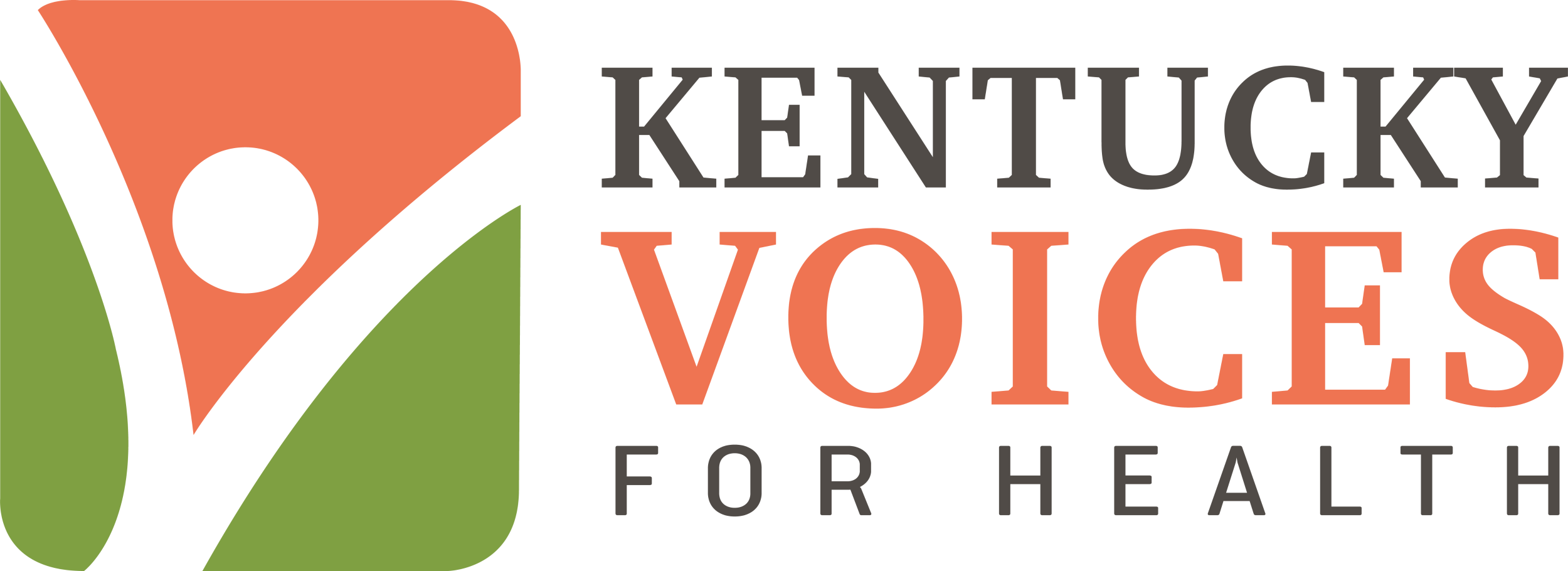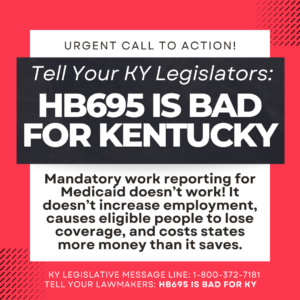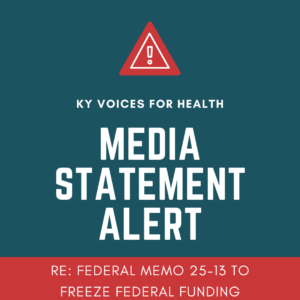
Last week, the Cabinet for Health and Family Services (CHFS) published its draft “analysis” of the public comments submitted during the most recent Federal comment period. The document purports to clear up “recurring misconceptions” surrounding Kentucky HEALTH. The document, which can be found notes that its explanations and clarifications apply to the version of the waiver that was vacated on June 29, 2018. We have analyzed the document and believe further clarification is warranted.
(For analysis of the comments from the Kentucky Center for Economic Policy, click here.)
First and foremost, many of these “misconceptions” are due to the lack of communication regarding these requirements. There is a wealth of information found on the Kentucky HEALTH website and videos are available as “learning opportunities” eligible for MyRewards “dollars.” However, all of these resources are only found on the internet, and assumes universal access for all beneficiaries across the state. Little written information, other than a couple of notices sent out in the spring, has been provided. In fact, no notices have been sent to Medicaid recipients explaining that implementation was halted on June 29th, that benefits eliminated in July were later restored, or that copays enforced in July are no longer mandatory. Kentucky need only look to the debacle in Arkansas to know that poor communication from the state will most certainly result in loss of coverage, even for those who meet the requirements.
Below is an analysis of the Cabinet’s clarification, where it gets things right and where it misses key facts that have not only contributed to certain misconceptions, but are likely to create real barriers to care for Medicaid recipients.
On the “Community Engagement” Requirements
For those who already meet SNAP/TANF(KTAP) requirements: the Cabinet states that SNAP/KTAP recipients who fulfill SNAP/KTAP requirements already meet the “Community Engagement” requirement.
It should be noted here that anyone who is a recipient of SNAP or TANF and is exempt from meeting a work requirement in those programs is also exempt from KY HEALTH PATH requirements. It is not simply that one is “meeting” those requirements.
The Cabinet states that full-time employees (those working 30+ hours per week) meet the PATH “Community Engagement” requirement. Full-time employees must provide documentation to verify their employment status.
Low wage earners often work in jobs with unpredictable hours and schedules. There will be many who move above and below this threshold fairly often. While reporting for Medicaid purposes isn’t necessary unless it’s a permanent and ongoing change (which may not be known), reporting new wages and hours for other programs may impact how that data is considered in the Medicaid calculation.
Primary caregivers of a dependent are exempt from the “Community Engagement” requirement.
The importance here is making sure people know this exemption is available to them. Limiting the exemption to care for adults who are dependents for tax purposes will further erode the impact of this important exemption.
Many beneficiaries may already be meeting the PATH “Community Engagement Requirement” by:
Working full-time (30 or more hours a week – no need to submit hours)
Working 20 or more hours a week (and submitting monthly hours)
Meeting SNAP/TANF program requirements
Taking classes in a full-time educational program
For those working the 20 hour a week threshold: According to regulations filed by the Cabinet, the only available way to report these hours or to claim good cause is through an internet portal called Citizen Connect. This assumes a lot. First, that all Medicaid beneficiaries have a certain level of computer literacy. Second, that all beneficiaries have a benefind account, which most do not. Setting up this account requires almost 20 steps, an email address, and online identity verification. Finally, it assumes universal access to internet services and devices, but such access is limited in many parts of the state. While some libraries may have loaner devices and hot spots, it is not clear whether capacity will match the need, and a lack of transportation to keep up with the devices will be an additional barrier.
Regarding caregivers: both primary caregivers of dependent minor children and disabled adult dependents are exempt from PATH requirements. Additionally, caregiving activities for non-dependents, such as caregiving services provided to elderly parents, will be counted as a qualifying activity for PATH.
Caregiving is caregiving. It should simply be an exemption. The division of “dependent” vs. “non-dependent” is confusing and will lead to additional unnecessary red tape. Those “countless Kentuckians” are helping disabled and elderly adults stay in their homes longer and save the human and financial costs of institutionalization.
On Refugees and Victims of Domestic Violence
Refugees and victims of domestic violence will be exempt from premiums, co-pays and “Community Engagement.” Those who qualify for Medicaid based on Medicaid expansion will be covered under the “Alternative Benefits Plan.” They will have to “pay” for dental and vision services using their “My Rewards” account, which will be credited with 500 virtual “dollars” and replenished “as needed.”
Proposed state regulations do not guarantee these individuals will not incur cost-sharing, and there is nothing in the regulation stating their MyRewards “dollars” will be automatically loaded as needed. It is unclear why separate, complicated policy and system processes for these individuals are necessary. If the ultimate idea is to treat these populations the same as medically frail individuals, then the treatment should be the same and they could be reported separately.
Additionally, domestic and interpersonal violence survivors may not know how to claim these important protections. The “gatepost” question that leads to this exemption is the same as that for the medically frail population, and simply asks “Are you in good health?” This can easily be overlooked by Domestic Violence/Interpersonal Violence survivors and individuals who are chronically homeless.
On Medically Frail and Disability
Those who receive social security disability insurance will be considered “Medically Frail.” Those who have a condition preventing them from working could also be determined “Medically Frail.”
Those considered “Medically Frail” are enrolled in the “State Benefit Plan,” which means that dental/vision services and access to non-emergency medical transportation services are covered. The “Medically Frail” are also exempt from PATH “Community Engagement” and paying premiums is optional. Those who pay premiums will have access to a “My Rewards” account to pay for “extra” services, such as fitness activities and over-the-counter medication.
To date, fitness services and over-the-counter medications aren’t available. If there is a timetable on implementing these services, it should be mentioned here, otherwise, there is no benefit to an individual who is medically frail to participate in cost sharing.
Kentuckians could be considered “Medically Frail” for a number of reasons, including chronic homelessness.
It needs to be clarified that, for Medicaid purposes, “chronic homelessness” is defined as three or more months of homelessness rather than the more-restrictive federal HUD definition. Also, having a disabling condition is not required to meet this definition. Again, persons attempting to claim this important exemption must answer “yes” to the gate post question “Are you in good health?” Only then will they be able to indicate the fact they are homeless.
Kentucky HEALTH will identify people as “Medically Frail” using four methods:
The Medicaid management information system will evaluate state health information for claims, diagnoses and treatment history.
Managed Care Organizations (MCOs) will evaluate a person’s medical claims or use a tool to screen for medically frail status.
Medicaid-qualified providers can report that their patient may be “Medically Frail” to the MCO (provider assessment)
The person can report that they may be “Medically Frail” to the MCO.
The tool used in such assessments is lengthy and confusing, even for providers and the MCOs who must interpret them. They are “scored” using proprietary algorithm that is the property of a third-party contractor. This means that a Medicaid beneficiary or their representative will not know how an MCO decided they were not determined medically frail. This will make appealing the decision difficult.
On Emergency Dental and Vision Services
The program will cover Medicaid-eligible medically necessary dental and vision coverage, but routine care will be moved to the “My Rewards” account for some.
First, let’s remember that immediately following the federal court decision that vacated Kentucky’s waiver and blocked implementation, the Cabinet eliminated dental, vision, and non-emergency transportation services for the Medicaid expansion population. While no children, pregnant women, or individuals with disabilities should have lost benefits, many did in the immediate aftermath. This should serve as a cautionary tale. Under Kentucky HEALTH, no one is exempt from the confusion and complexity of these new policies.
We also know that preventive dental and vision procedures provide great value to the Medicaid program by keeping beneficiaries healthy or discovering other health issues that need to be addressed. For example, during the time period that dental services were not available in July 2018, one patient was not able to access her cancer treatment due to not being able to get routine dental services completed–a requirement for ongoing cancer treatments. We also know dental and vision checkups can reveal issues with high blood pressure, diabetes, and other health conditions.
Beneficiaries (and the general public, for that matter) often will not know what makes a service “medically necessary” or not, which could lead to an assumption that no dental or vision services are covered.
On Benefits
Individuals will not lose medical benefits under Kentucky HEALTH.
While the underlying premise here is that all Medicaid beneficiaries can “earn” dental and vision benefits, and therefore haven’t lost these benefits, there is an important distinction to make between purchasing individual services (like a dental cleaning or eye exam) and having a comprehensive benefit. Furthermore, creating a layer of hoops to jump through in order to access services will, by definition, limit access to dental and vision services. Many of the activities to earn “dollars” are possible through the internet, but internet access is not a universal reality across the state, particularly in rural areas. Without support services like transportation assistance, and without low-cost public transportation across most of the state, completing enough activities to cover anything more than routine services will be difficult for many. Without regular access to vision and dental services, health problems will advance until conditions become urgent or emergent, requiring more expensive medical care.
On Lock Out Periods
A six month “penalty” period will effect those who are non-compliant with Kentucky HEALTH requirements. Individuals can complete re-entry requirements to regain coverage, and those suspended for premium nonpayment can avoid a gap in coverage even after the penalty is in effect by completing reentry requirements during the first month of the penalty.
It is correct to say that SUSPENSIONS aren’t for a specific amount of time. While suspensions can be cured earlier than six months, they can also continue beyond six months, until an individual’s redetermination date. If PATH requirements aren’t met by then, the individual is dis-enrolled. If it’s a premium payment suspension that isn’t fixed by the redetermination date and income is between 101% and 138% FPL, the individual is dis-enrolled.
“Lockouts” are different; these are penalties for not reporting income that leads to ineligibility, voluntarily withdrawing from the program, or not completing a redetermination on time.
Whether they’re called lockouts, penalties, or suspension, they are all policies that lead to a loss of coverage or access to vital services.
On Bureaucracy
A nuanced definition may be in order. There is no doubt that Kentucky HEALTH adds a lot of red tape to the Medicaid eligibility process, both initially and ongoing. With red tape comes additional activity to manage the requirements, whether that’s the state, the MCOs, or, most importantly, the beneficiaries. It is not possible to add this level of new reporting, payment systems, tracking, notices, and appeals and say this doesn’t add much bureaucracy; it’s not a misconception. These requirements aren’t necessary and may not be within the bounds of current Medicaid law, so any additional requirements on beneficiaries and government alike can be deemed “too much.”
The cabinet will:
Help individuals “better” use health care benefits
Help individuals use online reporting systems
Connect individuals to jobs in their areas
These are, indeed, important services. Why can they not be provided to beneficiaries as they need without the threat of the loss of coverage? Also, these services should not take any funds away from the program’s primary goal: providing health coverage.
The state has built on existing infrastructure within SNAP and Kentucky Career Centers to operationalize the “Community Engagement” initiative. The existing technology infrastructure that supports SNAP will also support Kentucky HEALTH.
It is interesting to draw this parallel with the SNAP Employment and Training Program. With almost 9 months of experience operating this program across the state, including some of the country’s most impoverished counties, it would be interesting to see just how successful this program has been and what lessons have been learned before launching the PATH work requirement.
The investment in developing the workforce is important not only to reduce unemployment, but also to improve health outcomes. There is a known link between health and employment, and as CMS states it is “essential to individual’s economic self-sufficiency, self-esteem and well-being.”
Actually, that link works best the other way. Studies do show a tangential link between working and better health (although, notably, not all jobs lead to better health). However, there is universal agreement that health leads to employment. In order to be productive on the job, people need to be healthy. Medicaid provides that basic level of care that keeps low-wage workers healthy and on the job.
On Cost
The Cabinet’s estimates suggest Kentucky HEALTH could save an estimated $2 billion in state and federal funds over the course of the demonstration.
First, it’s important to note that the cost per Medicaid beneficiary actually increases under the waiver. Any cost savings are due solely to estimates that more than 95,000 fewer individuals will be covered over the five-year demonstration.
Second, it would be useful to have a breakdown of state administrative costs (which, interestingly, CMS doesn’t use in determining cost neutrality of the waiver) compared against the state’s share of these assumed savings. Notably, an of this data by Fitch Ratings calls into question the ultimate cost neutrality of the waiver. Moreover, it’s important to note that 90% of that amount is federal tax dollars, not Kentucky general or restricted funds.
On Cost Sharing
Approximately 87% of Indiana’s Healthy Indiana Plan (HIP), also a Section 1115 Waiver, members reported they would pay more than 2% of income premiums to remain enrolled in the program and that affordability was not an issue for people who left the program.
This analysis of HIP only takes into consideration those who made payments to begin coverage (called “ever enrolled”) and does not take into consideration the percentage of applicants for whom premiums were a barrier to coverage and never became eligible. Upon further analysis, evaluators found that more than half of Medicaid recipients missed at least one premium payment and, on average, about 1 in 3 people who applied for Medicaid never paid their initial premium, meaning they never fully enrolled. And of course, let’s not forget that Kentucky is not Indiana.
For more information on Indiana’s evaluation findings and how they relate to Kentucky HEALTH, read this article from the Center for Budget & Policy Priorities.
Conclusion
Healthcare should mean more than providing a Medicaid card.
Health care is access to physicians, hospitals, mental health professionals, and other medical services. That is exactly what Medicaid is designed to do. Other factors play a large role in an individual’s overall health, but actual healthcare coverage and access to services must serve as a baseline for all other efforts. Removing coverage simply makes all other efforts fall short.
The current system has not improved health outcomes in Kentucky.
According to a 2016 Harvard study that included Texas (a non-expansion state), Arkansas and Kentucky, there was a clear correlation between expanding Medicaid and improved health. In fact, Kentuckians and Arkansans reported better health, access to primary care providers, medication adherence, chronic disease management, and financial security.
Medicaid expansion as enacted has not “moved the needle” on poor health outcomes and the Commonwealth can’t continue a program that does not motivate participants toward better health outcomes and overall well-being.
The suggestion that Medicaid beneficiaries simply lack the motivation to improve their overall health ignores the systemic realities that impoverished people face every day. Rather than making these services available with the supports that will better ensure success without fear of coverage losses, the Cabinet has chosen a presumptuous and paternalistic path that, for many, will be unattainable.
Since Medicaid expansion was enacted the Federal funding has been reduced.
Since 2014, Kentucky has benefited from an influx of billions of new federal dollars and a major reduction in uncompensated care. Together, new revenue and savings have:
Resulted in thousands of new jobs
Generated increased state and local tax revenue
Led to expanded dental, behavioral health and substance use services
Stabilized the finances of many rural hospitals, rural health clinics, and federally qualified health centers
Federal funding for Medicaid expansion was designed to start at 100% and slowly reduce to 90% by 2020. There is time to explore funding opportunities. The cabinet should encourage the work of stakeholders exploring changes to provider taxes that would support continuation of expanded Medicaid for ALL eligible beneficiaries without taking coverage away through onerous red tape.
Kentucky HEALTH will:
- Improve beneficiary health and well-being by taking a holistic approach to health that considers social and economic factors. Unless an administrative requirement trips a beneficiary up and cuts off coverage.
- Empower beneficiaries to be more active and informed about their healthcare and available resources. But those resources will only be helpful if they can get to them. The loss of non-emergency Medicaid transportation will make that harder for many beneficiaries.
- Provide beneficiaries skills to transition them successfully to commercial health insurance. The existence of Kentucky HEALTH does not create job opportunities with employer sponsored health insurance.
- Support the long-term fiscal sustainability of the Commonwealth’s Medicaid program. Again, incurring losses in coverage will not be healthy for Kentucky economically nor for the health of its residents. Losses in coverage and losses in benefits will hit rural providers the hardest, and will likely lead to losses in vision and dental providers (already scarce in many areas).
- The Kentucky HEALTH program will help make Kentucky a healthier state and ensure our most vulnerable populations will always be protected.
The best way to ensure our most vulnerable populations will always be protected is to find ways to ensure their continued coverage, not by setting up a series of complicated and confusing barriers to coverage and services. There are opportunities to ensure continued funding of expansion and addressing other health determinants that does not lean on such punitive measures.




